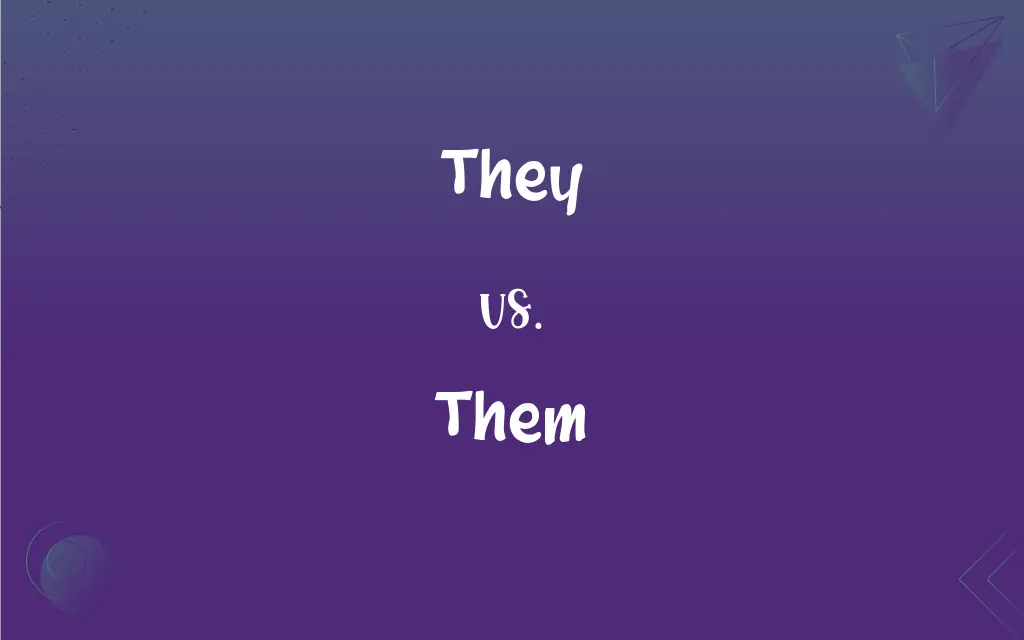They vs. Them: What's the Difference?
By Janet White || Published on December 16, 2024
"They" is a subject pronoun used for referring to people or things in the plural form, while "them" is an object pronoun used to refer to the objects of a verb or preposition.

Key Differences
"They" and "them" serve different grammatical roles in sentences. "They" acts as the subject, performing the action of the verb, e.g., "They are walking." In contrast, "them" is used as the object, receiving the action of the verb or following a preposition, e.g., "I saw them yesterday."
The choice between "they" and "them" depends on the pronoun's function in the sentence. When referring to a group performing an action, "they" is used. When the group is receiving an action or is the object of a sentence, "them" is appropriate.
"They" can also be used as a singular pronoun to refer to someone whose gender is not specified or to individuals who identify outside of the binary gender categories, maintaining the same verb agreement as its plural form. "Them," in singular use, serves as the object pronoun in these contexts as well.
In questions and statements, the placement of "they" and "them" changes the focus. For example, "Who are they?" versus "Who did you give it to? To them?" This illustrates how "they" seeks information about the subject, while "them" is used in relation to an action or direction.
Understanding the difference between "they" and "them" is crucial for correct English syntax, aiding in clear communication. Misusing these pronouns can lead to confusion about who is performing an action versus who is receiving it.
ADVERTISEMENT
Comparison Chart
Role
Subject pronoun
Object pronoun
Function
Performs the action
Receives the action or follows a preposition
Example
"They are studying."
"I will call them."
Number
Plural (can be singular for gender neutrality)
Plural (can be singular for gender neutrality)
Placement
Before the verb
After the verb or preposition
ADVERTISEMENT
They and Them Definitions
They
Used for individuals who prefer gender-neutral terms.
They are coming to the party alone.
Them
Used to refer to multiple people or things.
I invited them to dinner.
They
Refers to a specific set of people or things.
They have won the championship.
Them
Respecting gender identity in object position.
I met them at the conference.
They
Used in passive voice constructions.
They were given the award for bravery.
Them
Follows prepositions.
This gift is for them.
They
Refers to more than one person or entity.
They are playing soccer.
Them
Used in indirect speech.
She told them the news first.
They
Implies authority or unspecified people.
They say it’s going to rain.
Them
Receives action in a sentence.
The teacher asked them a question.
Them
Those
"Them dogs will find the end of them footprints before ten o'clock" (William Faulkner).
Them
Used as the direct object of a verb.
She treated them for a cold.
FAQs
Can "they" be used for a single person?
Yes, "they" is used as a singular pronoun for someone who identifies outside of binary gender categories or when the gender is unknown.
What is the significance of using "they/them" pronouns for individuals?
Using "they/them" pronouns for individuals respects their gender identity and preferences, promoting inclusivity and recognition of non-binary identities.
Can "they" and "them" refer to the same group of people in a text?
Yes, "they" and "them" can refer to the same group, with "they" used when the group is the subject and "them" when it is the object.
Are there instances where "they" and "them" can be used interchangeably?
"They" and "them" cannot be used interchangeably due to their distinct grammatical roles as subject and object pronouns, respectively.
What strategies can help in mastering the use of "they" and "them"?
Practice identifying subjects and objects in sentences, understanding pronoun roles, and using exercises focused on pronoun agreement can improve mastery.
How do you decide whether to use "they" or "them" in a sentence?
Determine if the pronoun is acting as the subject or object of the sentence; use "they" for subjects and "them" for objects.
How do English learners typically mistake "they" for "them"?
English learners might confuse "they" for "them" when distinguishing between subjects and objects in sentences, especially in complex structures or passive voice.
Is it grammatically correct to use "them" after a preposition?
Yes, "them" is correctly used as the object of a preposition, e.g., "The message was from them."
How does the use of "they" or "them" affect the tone of a sentence?
The use of "they" or "them" does not inherently change the tone but can influence clarity and focus on either the action's performer or recipient.
What is the historical background of the singular "they"?
The singular "they" has been used for centuries in English as a gender-neutral pronoun, with its acceptance and usage evolving over time.
How do different style guides recommend the use of "they" and "them"?
Style guides increasingly endorse the singular "they" for gender neutrality and clarity, with recommendations varying slightly on usage specifics.
Can "they" and "them" be used in formal writing?
Yes, both pronouns are acceptable in formal writing. The singular "they" is increasingly recognized in formal contexts for its inclusivity.
What cultural implications does the choice between "they" and "them" have?
The choice reflects and can influence societal attitudes towards gender, highlighting the importance of language in shaping and reflecting cultural norms.
What are the implications of using "they" and "them" in gender-sensitive communication?
Their use is crucial for respectful and inclusive communication, allowing individuals to be addressed without imposing gender assumptions.
How does the evolving usage of "they" and "them" reflect changes in language and society?
The adaptation of these pronouns mirrors broader societal shifts towards recognizing and respecting gender diversity, illustrating language's dynamic nature.
What are the challenges in translating "they" and "them" to languages with gendered pronouns?
Translating into languages with strict gender pronouns can be challenging, requiring careful consideration to convey gender neutrality accurately.
How do "they" and "them" function in legal and official documents?
In legal contexts, "they" and "them" are used with precision to avoid ambiguity, with the singular "they" gaining acceptance for inclusivity.
Can the use of "they" as a singular pronoun be considered grammatically correct?
Yes, the singular use of "they" is grammatically correct and recognized by major dictionaries and style guides for its inclusivity and versatility.
How does context influence the selection of "they" or "them"?
Context determines the role the pronoun plays in a sentence (subject or object), guiding the appropriate choice between "they" and "them."
In what ways does the misuse of "they" and "them" impact readability?
Misuse can lead to ambiguity or confusion regarding who is performing or receiving actions, potentially hindering comprehension.
About Author
Written by
Janet WhiteJanet White has been an esteemed writer and blogger for Difference Wiki. Holding a Master's degree in Science and Medical Journalism from the prestigious Boston University, she has consistently demonstrated her expertise and passion for her field. When she's not immersed in her work, Janet relishes her time exercising, delving into a good book, and cherishing moments with friends and family.






































































